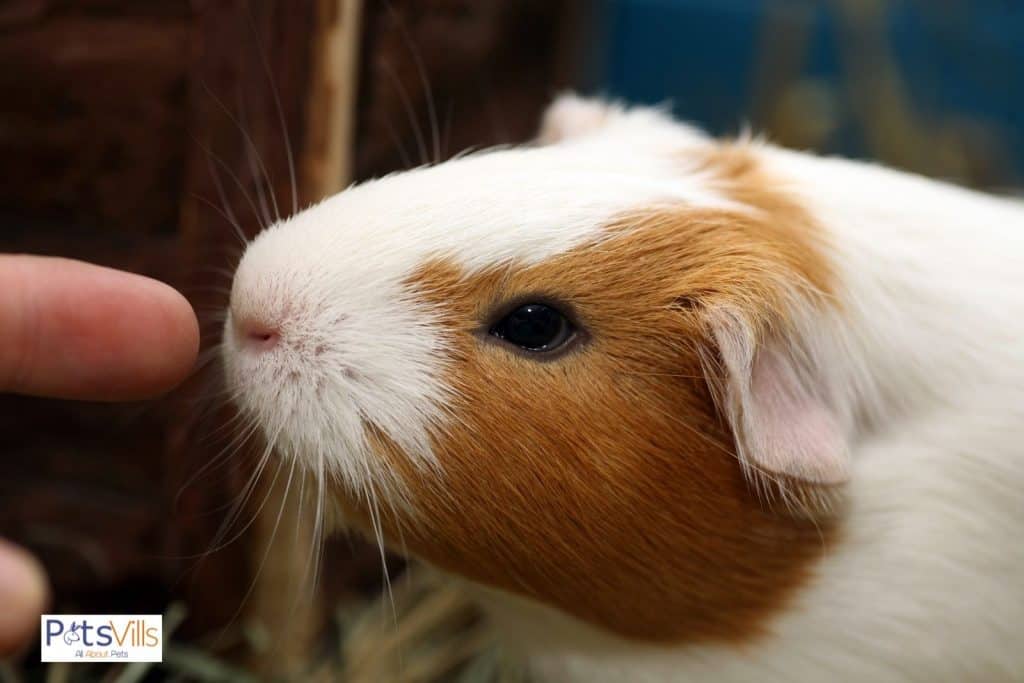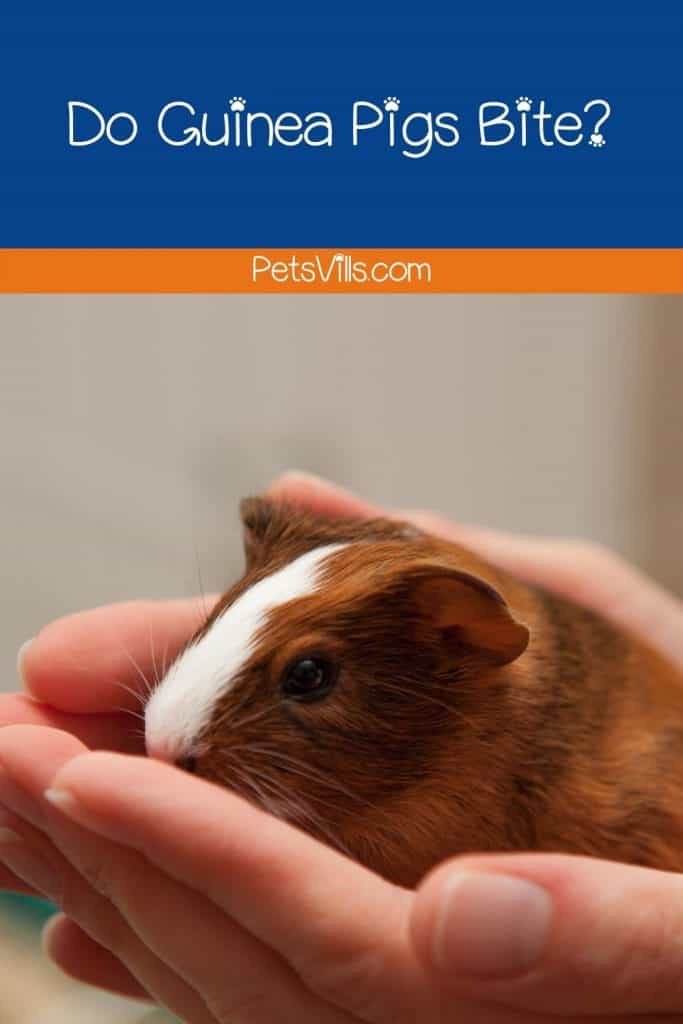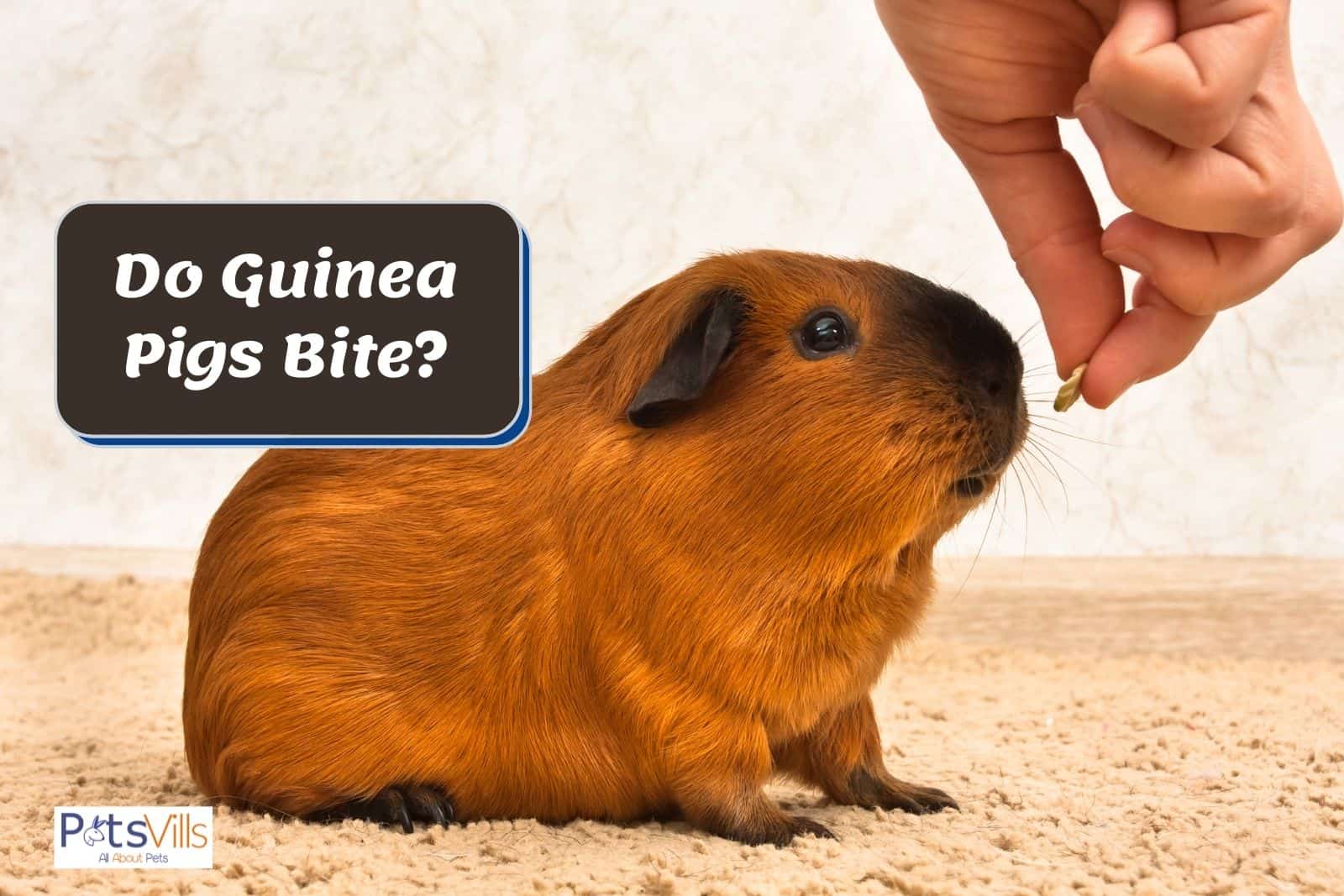Happy and tamed guinea pigs will rarely bite, so it can be confusing and worrying when they do lash out.
Do Guinea Pigs Bite? Guinea pigs can bite or nip, but this is usually when they mistake you for food or they feel threatened.
Read on to find out more about why your guinea pigs might be biting you and how to solve it.
READ MORE: Do Guinea Pigs Kill Each Other?
Table of Contents
Do Guinea Pigs Bite?
Guinea pigs are usually docile and friendly pets, but they can bite and act aggressively for various reasons.
If you’ve not had your guinea pig long, then they could bite or nip you. This is because your guinea pigs are still not used to you or being handled.
Guinea pigs are prey animals and their only defense mechanisms involve running away from and biting a potential threat.
When guinea pigs feel frightened or unhappy, then they are more likely to bite. This is especially true if they cannot flee from the thing they are afraid of (like being held).

That’s why it’s important to gain the trust of your guinea pigs. Not only will your guinea pigs feel more comfortable and confident around you, but they are also much less likely to bite.
Additionally, your guinea pigs might bite or nip if your hands smell like food. To help counteract this, you should make sure you wash your hands with unscented soap before handling your guinea pigs.
If you’ve noticed your guinea pigs bite or nip you during feeding time, this could be because they are excited to be fed or associate you with food.
Guinea pigs may also bite when they need to urinate or go to the toilet when you are holding them. Some signs your guinea pig might need to relieve itself include fidgeting, squirming, and nipping.
Wearing thick or leather gloves when you feed or handle your guinea pigs could help protect your hands.
If your guinea pigs are tamed and have recently started biting you, then there could be a few reasons for this.
Do Guinea Pigs Bite Hurt?
A guinea pig bite will not hurt you. Their teeth aren’t sharp enough to puncture your hand. Their bite will be somewhat of a nibble. Most of the time, they will mouth your hands, but this is to see if you’re edible or you have something on your hands.
When the guinea pigs realize that your hand isn’t food, they will stop nibbling on it.
Here are some ways you’re hurting your guinea pig without realizing it.
2 Reasons Why Guinea Pigs Bite
1. Mites
One of these could be mites or other external parasites. Mites are very small parasites that live in your guinea pigs’ fur and feed off the keratin layer of their skin.
You cannot see mites, but some signs your guinea pigs might have them include:
- Reddened or scaly areas on the body
- Hair loss in affected areas [1]
- Excessive scratching and biting, particularly at the shoulders, neck, and back
- Dandruff/flaky skin
Mites are unpleasant and can make your guinea pigs more irritated than usual. This could lead to biting and nipping, especially if you touch a sore or tender area.
Mites can be treated with an anti-parasite treatment that’s safe to use on guinea pigs.
You should also thoroughly clean your guinea pigs’ cage and bedding (as well as any other places they have come into contact with) as mites and mite eggs will also be present in these.
Book an appointment with your vet if you suspect your guinea pigs have mites as they will be able to offer treatment and advise you further. Mites can be serious if they are left untreated.
2. Pain Or Sickness
Regular health checks are important to keep your guinea pigs happy and healthy. If your guinea pigs are in pain or are unwell, then they are likely to be irritable and nippy.
If you accidentally touch a painful or tender area on your guinea pig, then it could retaliate with a bite.
Make sure you are regularly checking your guinea pig’s behavior and body for signs of illness.
READ MORE: Should Guinea Pigs Live Alone?
How to Train Your Guinea Pigs to Stop Biting You
To train your guinea pigs to stop biting you, you need to identify the reason behind their biting.
If you have not had your guinea pigs very long or they are young, then they are probably biting out of fear or anxiety.
Allowing your guinea pigs to become used to your hand by placing it inside their cage can help them stop viewing it as a threat.
Additionally, offering your guinea pigs treats for good behavior is a great way to train them to stop biting.
If your guinea pigs approach you and do not bite, then feed them a treat.
However, if your guinea pigs nip you when they come up to you, don’t feed them the treat.
Don’t punish your guinea pigs if they bite. Instead, ignore the behavior and don’t give them the treat.
Continue to talk to them in a gentle voice and try the process again in a few minutes.
If your guinea pigs approach you this time and don’t bite, then you can reward them with a treat.
Your guinea pigs will begin to understand that they only receive a treat when they are well-behaved and don’t bite.
You should also make sure you are handling your guinea pigs correctly. If you mishandle or are too rough when holding your guinea pigs, then they could bite you. [2]
Don’t chase your guinea pigs around their cage when you want to hold them. Instead, let them come to you.
To pick up one of your guinea pigs, slide your hand underneath it and support its feet and stomach.
Use both your hands to hold your guinea pig to make it feel more secure.
You should make sure you hold your guinea pig close to the ground so it can’t injure itself if it falls or jumps.
The Steps You Should Take if Your Guinea Pigs Bites You
If your guinea pig bites you, make sure you put it back into its cage or hand it to someone else so you can deal with your bite.
Wash the area where you were bitten under warm water with soap to help prevent infection. If your guinea pig has drawn blood, then you should use plaster to help stop the bleeding.
If your bite is bleeding a lot, then apply pressure to the wound for at least 5 minutes with a towel or cloth to help stop the bleeding. Use clean and sterile dressing to cover the bite.
Guinea pig bites can be very painful, but they are usually not serious. However, if your bite does not stop bleeding or you notice swelling, redness, or pus, then you should consult a medical professional.
Additionally, if you are feeling generally unwell or develop flu-like symptoms, then you should seek medical help.
Read more facts about guinea pigs!
Keep Your Guinea Pigs Away From Other Animals
You should always keep your guinea pigs away from other animals, even rabbits.
Letting other animals or pets come into contact with your guinea pigs can be dangerous, frightening, and extremely stressful for them.
Other animals could severely hurt your guinea pigs and vice versa. A common misconception is that rabbits and guinea pigs can be housed together.
Rabbits should never be housed with or introduced to your guinea pig as it can result in fighting and aggression.
When guinea pigs are stressed or scared, they are more likely to act defensively and bite. Stressed guinea pigs are also at a higher risk of getting ill.
Gaining The Trust of Your Guinea Pigs
Gaining the trust of your guinea pigs is vital to prevent them from biting or being scared of you.
If you have not had your guinea pigs very long, then they are likely to be timid and fearful of you. This is especially true if they are not used to human contact.
Start off by allowing your guinea pigs to settle in for a few days before you begin training them.
After enough time has passed, you can begin talking to them so they become accustomed to your voice. Speak in a soft and gentle tone.

When your guinea pigs have become used to your voice, you can step up the pace.
Wash your hands thoroughly with unscented soap to get rid of any potential food smells.
Place your hand inside your guinea pigs’ cage. You could try rubbing your hand in their bedding to help transfer their scent to you.
Don’t use quick or jumpy movements as you could scare your guinea pigs. Be very still and let your guinea pigs approach you to investigate.
Let your guinea pigs sniff you. Try not to be too nervous. Your guinea pigs are just curious and making sure you’re not a threat.
When your guinea pigs start to become used to your hand inside their cage, you can use treats.
Treats are a great way to tame your guinea pigs to let them know you’re not to be feared.
Treats help your guinea pigs associate you with something positive, which will stop them from being afraid of or nervous around you.
Make sure you are interacting with your guinea pigs daily to help them trust you. If you’re consistent with your guinea pigs’ training, then they will trust you a lot quicker.
Get more handy tips on this video:
The Dos and Don’ts When Dealing with Guinea Pigs
Dos
1. Handle or interact with your guinea pigs regularly and properly
In order to gain your guinea pigs’ trust, you need to handle or interact with them regularly and properly.
You should interact with your guinea pigs daily so that they become used to you and don’t view you as a threat. Untamed or poorly-socialized guinea pigs are much more likely to bite.
When handling your guinea pigs, make sure you do it correctly. Don’t chase your guinea pigs around when you’re trying to pick one of them up. This will stress and frighten your guinea pigs.
Use slow movements and wait for your guinea pigs to approach you before you pick them up. When you are holding your guinea pigs, support their stomach and feet so they feel more comfortable.
2. Clean your guinea pigs’ habitat regularly
Cleaning your guinea pigs’ cages often will make them healthier and happier. An unsanitary environment is stressful for guinea pigs and will make them unwell.
The ammonia in your guinea pigs’ urine can lead to respiratory infections when it is left to build up for a long time.
You should aim to do a full clean of your guinea pigs’ cage every 5-7 days. Depending on the type of bedding you use and how many guinea pigs you own, you may need to clean their habitat more often.
Daily spot cleans can help reduce the amount of time you spend cleaning your guinea pigs’ cages.
Spot cleans involve removing dirty bedding and tidying up the general area of your guinea pigs’ cage to make it easier and less time-consuming when you need to do a full clean.
3. Feed your guinea pigs a well-balanced diet
Guinea pigs need a lot of hay/grass in their diets (80%!), so you should always make sure your guinea pigs have access to hay to munch on.
Hay contains a lot of fiber which helps your guinea pigs digest. Hay also helps your guinea pigs’ teeth by wearing them down so they don’t get too long.
Your guinea pigs also need vitamin C in their diets. Vitamin C comes from leafy greens and vegetables, as well as high-quality guinea pig nuggets/pellets.
Some good vegetables packed with vitamin C to feed your guinea pigs include kale, spinach, parsley, broccoli, and asparagus.
Don’ts
1. Never house your guinea pigs with other animals
Guinea pigs should never live with animals (even rabbits!) except for other guinea pigs. Living with another animal can be extremely stressful for guinea pigs, often leading to aggression, fighting, and biting.
There is also the possibility that another animal could transmit an illness or disease to your guinea pigs (and vice versa).
2. Never punish your guinea pigs
You should never punish your guinea pigs, even if they bite you or urinate on you. Shouting at or hitting your guinea pigs are not effective training methods and will make matters worse.
3. Don’t use small cages
Guinea pigs are large rodents, so they need a big cage to live in.
You should make sure your guinea pigs’ habitat is large and spacious.
For one or two guinea pigs, you should aim for at least a 7.5 square feet cage. If you own multiple guinea pigs, then you will need to provide them with a larger habitat.
READ MORE: Do Guinea Pigs Smell?
FAQs
Where do guinea pigs originate from?
Guinea pigs originate from South America. They have been domesticated since 2000 BC.
Are guinea pigs hard to look after?

Guinea pigs are fairly easy to look after as long as you clean their cage regularly, feed them properly, and give them enough attention.
How long do guinea pigs live?
Guinea pigs can live anywhere between 4-8 years in captivity.

Resources
- 1. Mites in Guinea Pigs [Internet]. vca_corporate. 2021 [cited 2021 Dec 6]. Available from: https://vcahospitals.com/know-your-pet/mites-in-guinea-pigs
- 2. Ades E. Restraint Techniques for Animals [Internet]. Jhu.edu. 2010 [cited 2021 Dec 6]. Available from: https://web.jhu.edu/animalcare/procedures/restraint.html
Did your guinea pig ever bite you? Tell us how you gain guinea pig trust in the comments below!
Alina Hartley is a small-town girl with a ginormous love of bearded dragons. It all started with Winchester, a baby bearded who was abandoned at the shelter by his former owners because of a birth defect that caused one front leg to be shorter than the other. Alina originally went to the shelter looking for a guinea pig, but one look at Winchester and it was love at first sight. From that day on, Alina has dedicated her life to learning everything she can about bearded dragons. She loves helping new beardie parents start their incredible journey with these magnificent reptiles.
Follow her on:
LINKEDIN
TWITTER.
Read her latest articles HERE
Learn more about her HERE.


